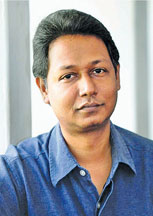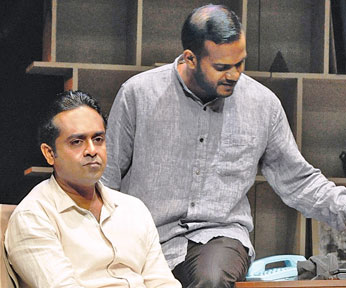|
Adara Wasthuwa:
Illusions fade to bare bitterness
Reviewed by Dilshan Boange
Love; it is perhaps the most elusive of human states of emotion that
defies finality in definition. And a topic that never fades out from the
human mind's curiosity. But how can love be defined in terms of its
manifold manifestations that differentiate on the basis of the
relationships between the people who share that love? Is there anything
called unconditional love between 'lovers'? When a physical relationship
of intimacy is a key objective in a relationship is there anything
called love or was it merely a complex construction driven by lust?
|

Dramatist Rajitha Dissanayake |
Sitting in the gentle darkness at the Wendt on the opening night of
veteran playwright and director Rajitha Dissanayake's latest creation to
the theatre Adara Wasthuwa titled in English as Love object, I was
struck by a line delivered by the character of Madahvi which says to the
effect that 'Love is an illusion we trick ourselves into knowingly'.
Knowing the following Rajitha has among theatregoers I have no doubt
that much discussion will ensue in the days ahead as Adara Wasthuwa
comes to life in theatres in Sri Lanka. And what I find most
praiseworthy about this new production is its intenseness in terms of
being bound to the present day political climate and delivering a
critique of what is around us, here and now.
To those who consciously watch the play the two principal male
characters Navin and Suren will surely be identifiable in terms of two
very real, actual, living people who are making notable headway in their
respective fields of work and activism in the current political
landscape.
Navin and Suren
The character of Navin, a senior university lecturer, enjoying the
additional position of an advisor to a government ministry may become
instantly familiar as a character who carries dimensions of a certain
outspoken, articulate, charismatic academic of the political science
discipline. He is don from the hallowed halls of the Colombo University.
To those of us who see Suren develop on stage, realising his position
as a man now in the echelons of power is as one whose rise had been
meteoric, and seeing his line of business we may not be able to help but
be reminded of a certain media mogul of today whose rise to prominence
has been awe-inspiring. And again how the hallowed halls of the Colombo
University are linked to this person as well, did not escape my mind.
The perseverance that has taken him very far in life today makes him
undoubtedly a 'victorious hero'.
|

A scene from the play |
What also strikes one, in going to the root of dissecting the
ingredients of the characters that connect with actually identifiable
people, is that the playwright too is after all from that very same seat
of learning -the Colombo University. But of course how much of what we
see unfold on stage in Adara Wasthuwa is meant to actually mirror living
people and events that Rajitha may or may not know personally is
anyone's guess. As much as a reviewer can speculate and claim a right to
do so, he should not also be hasty to attempt to write verdicts and
pronouncements of finality. Especially not as with matters as delicate
as what this play offers as part of the crux of its critique.
Love and its antithesis
Is hate the antithesis of love? If so can we ever truly hate a person
whom we claim to have truly loved? This is a central introspective
question that Rajitha raises in his story. Pondering on this matter I'm
reminded of what my paternal uncle Yasantha Boange who bears a
reputation as a sculptor specialising in wood carvings, once told me,
which was, that in his conceptions, 'Love is hate, hate is love.' The
belief that both these emotions are so intense that they originate from
the same 'root' is what was at the crux of what he said. This gives us a
glimpse I feel symbolically of the undeniable duality, the dichotomy,
the Jekyll and Hyde that is true in humans.
'Love' at the age of 40 isn't 'love' at the age of 16, says Navin at
one point when he is badgered by Vidura the unrelenting student union
activist who keeps demanding Navin's 'stance' in writing to a proposed
bill on education reform. What Navin is rebutted with by Vidura is that
love at 40 is about trying to 'score' with young girls who are around
the age of 16. This showed the common perception about how the 'naughty
forties' tag can get deduced into the picture very hastily when a person
who has hit 40 speaks of 'love' and that being more so when the man
concerned is a 'university lecturer'.
Love and power
This play thereby also speaks of the topic of how relationships
between female students and lecturers characterise an aspect of the
university system and the politics that build therein. Following this
line of discussion I'd like to express that Rajitha's play isn't purely
about love looked at posited in the psychological premise. The play
explores love as an emotion in connection with personal relationships
and power. And also how 'desire' translates into another form of 'love'.
Suren is a man whose desire for power and position makes him
something of a man in love with his ambitions. One needs only think of
those words ascribed to Napoleon who had supposedly said -'Power was my
mistress'. Navin comes off as the more humane power seeker who will not
subscribe to Suren's outlook which negates all personal bonds where
power and the price of power are at stake. Although friends since
undergrad days in campus Suren after all shows that he isn't beyond
pulling the trigger on Navin if need be. And while all this goes on, the
detailed revelation of how the plan to oust the government in power
through the support of the mass media which includes both Suren and
Navin as key players, Madhavi safely eavesdrops hiding behind a
bookshelf out of Suren's sight.
The binding past
Madhavi may seem the typical story of the female undergrad who falls
for the alluring young lecturer whose larger than life personality on
campus draws female admirers who realise later they were just moths who
made the power of the flame proven to the world around. But what I think
is admirable in the character of Madhavi is that her expectation from
her lover was not the demand of marriage as an unpronounced tethering on
grounds of decency and moral obligation, but to be sincerely appreciated
and be treated with considerateness.
Between these two lovers who meet after much water has flowed under
the bridge what may be openly spoken happens in a different context as
individuals. They are no longer in that previous framework of
relationships where institutionalism and the power relations that come
into being exist. Madhavi is no longer an undergrad. But the hold that
her past as Navin's 'girlfriend' has on her reinforces that memory of
power Navin had over her. A power that was curiously blended with a love
that had an institutional presence involved.
Marriages and conspiracies
As Suren steps out the door we hear gunshots. Suspicions of whether
information about their anti-government activities had already been
leaked to the regime is possibly answered at that point. But of course
Navin's only words to Madhavi are to 'go safely'. There at that point I
feel is where the space to speak of a love that is characterised by
caring for the lover comes visibly. However, that is the very point when
the play ends with the stage gaining darkness and the spotlight falling
on Navin who stands motionless to the audience.
A very noteworthy point brought out by Navin, played effectively by
Shyam Fernando, is that love is about trying to own what is not possible
to own. Madhavi accuses Navin of deceitfulness and never really having
had any love for her except when he got into bed with her.
Navin presumes her accusations are based on the fact that his
relationship with her was one intended never to lead to matrimony. Given
our cultural outlook and values one may ask is marriage the culmination
of a love shared deeply between two people, or could it be the end of
that love? It is, I feel, a question not without valid ground, though
perhaps not as readily answered in society.
Conspirators beware
What I'm driven to wonder given the explosiveness of the nature of
the conspiracy Suren and Navin are involved in what sort of messaging is
the audience to read out of the play? Is Rajitha trying to tell us that
all plots against a regime are doomed to fail at some point? Or is he
trying to say that whoever takes a plunge into the deep end of the
water, better make sure his training wasn't done in the baby pool! These
are some of the hard hitting highly politically charged underpinnings in
Adara wasthuwa.
I don't know to what extent Rajitha intended or didn't, but the
subtext of the play shows a form of love that is common to every one of
the characters in that play, which is the love for oneself. One's
personal progress in life is certainly a factor that motivates them
towards their choices in life. In this respect perhaps every
individual's unfailing 'object of love' is oneself. It is for the record
merely what I critically read from the performance.
In respect of stagecraft what is seen in Adara Wasthuwa is a very
conventional plan where narrative techniques of theatre have not been
exploited to richly texture the play's text. In this respect this play
doesn't offer the viewer those effects one finds in Rajitha's previous
plays such as Apahu Harenna Baha or Veeraya Marila. But the almost
claustrophobic setup that runs the full length of the play infers a more
jarringly realistic approach shedding all the distractions and
diversions that usher in moments of relief.
No, Rajitha doesn't offer much relief to the viewer from the
bitterness of the pill that is surreptitiously thrust down our throat.
The subject called love is not always chocolaty. It is bitter sweet. But
the after taste the playwright constructs to linger is the bitterness of
love when read in the context of power relations. A bitterness seen as
hate. And perhaps the playwright saw no reason to sugar it. Since after
all there are enough illusions that blind us to bitter truths, as it is. |


